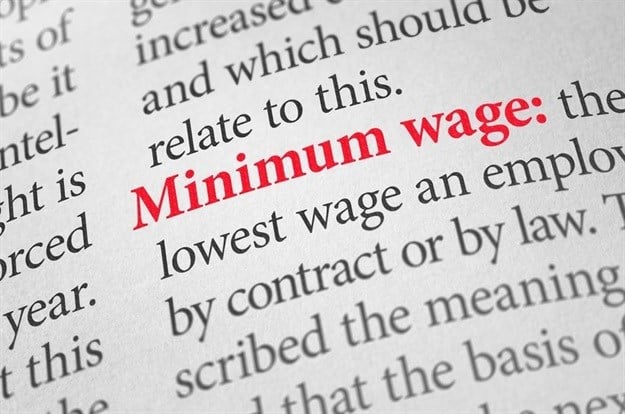#RecruitmentFocus: What you need to know about the new National Minimum Wage Act

Who does the NMWA apply to?
The NMWA applies to all workers and their employers, except members of the South African National Defence Force, the National Intelligence Agency, the South African Secret Service; and volunteers who perform work for another person without remuneration. It applies to any person who works for another and who receives, or is entitled to receive, any payment for that work whether in money or in kind.
What is the national minimum wage?
The national minimum wage is R20 for each ordinary hour worked. There are, however, certain exceptions to the national minimum wage amount of R20 per hour:
Farm workers are entitled to a minimum wage of R18 per hour. A 'farm worker' means a worker who is employed mainly or wholly in connection with farming or forestry activities, and includes a domestic worker employed in a home on a farm or forestry environment and a security guard on a farm or other agricultural premises, excluding a security guard employed in the private security industry.
Domestic workers are entitled to a minimum wage of R15 per hour. A 'domestic worker' means a worker who performs domestic work in a private household and who received, or is entitled to receive, a wage and includes: a gardener; a person employed by a household as a driver of a motor vehicle; a person who takes care of children, the aged, the sick, the frail or the disabled; and domestic workers employed or supplied by employment services.
Workers employment on an expanded public works programme are entitled to a minimum wage of R11 per hour from a date that will be determined by the President in the Government Gazette. Expanded public works programme means a programme to provide public or community services through a labour intensive programme determined by the Minister and funded from public resources.
Workers who have concluded learnership agreements contemplated in section 17 of the Skills Development Act 97 of 1998 are entitled to the allowances contained in Schedule 2 of the NMWA.
Employer's should note that, within 18 months of the commencement of the NMWA, being 1 January 2019, the National Minimum Wage Commission, will review the national minimum wage of farm workers and domestic workers, and within two years, determine an adjustment of the applicable national minimum wage. The national minimum wage in respect of workers in the expanded public works programme will be increased proportionately to any adjustment of the national minimum wage.
How is the national minimum wage calculated?
The calculation of the national minimum wage is the amount payable in money for ordinary hours of work. It excludes:
- any payment made to enable a worker to work including any transport, equipment, tool, food or accommodation allowance, unless specified otherwise in a sectoral determination;
- any payment in kind including board or accommodation, unless specified otherwise in a sectoral determination;
- gratuities including bonuses, tips or gifts; and
- any other prescribed category of payment.
'Ordinary hours of work' means the hours of work permitted in terms of section 9 of the Basic Conditions of Employment Act 75 of 1997 (BCEA) (currently 45 hours per week) or in terms of any agreement in terms of section 11 or 12 of the BCEA. A worker is entitled to receive the national minimum wage for the number of hours that the worker works on any day. An employee or worker who works for less than four hours on any day must be paid for four hours on that day. This is applicable to employees or workers who earn less than the earnings threshold set by the Minister over time, presently being R205,433.30. If the worker is paid on a basis other than the number of hours worked, the worker may not be paid less than the national minimum wage for the ordinary hours of work.
Any deduction made from the remuneration of a worker must be in accordance with section 34 of the BCEA, provided that the deduction made in terms of section 34(1)(a) of the BCEA does not exceed one quarter of a worker's remuneration.
Does a worker have a right to the national minimum wage?
Every worker will be entitled to payment of a wage not less than the national minimum wage. Employers will be obligated to pay workers this wage. The payment of the national minimum wage cannot be waived and overrides any contrary provision in a contract, collective agreement, sectoral determination or law.
Must a worker's contract of employment be amended in light of the NMWA?
The national minimum wage must constitute a term of the worker's contract, unless the contract, collective agreement or law provides for a more favourable wage. Employers should thus, where applicable, amend their contracts of employment to make reference to the national minimum wage. An employer should note further that a unilateral change of wages, hours of work or other conditions of employment in connection with the implementation of the national minimum wage will be regarded as an unfair labour practice.
When does the provisions of the NMWA come into effect?
The NMWA will came into operation on 1 January 2019. Section 4(6) of the NMWA, which prohibits the payment of the national minimum wage being waived and further provides that the national minimum wage takes precedence over any contrary provision in any contract, collective agreement, sectoral determination or law, operates with retrospective effect from 1 May 2017.
Can an employer be exempt from paying the national minimum wage?
An employer or employer's organisation registered in terms of section 96 of the Labour Relations Act 66 of 1995 (LRA), or any other law, acting on behalf of a member, may apply for exemption from paying the national minimum wage. The exemption may not be granted for longer than one year and must specify the wage that the employer is required to pay workers. The exemption process provided for in the regulations to the NMWA must be complied with when doing so.
An employer or a registered employer's organisation may assist its members to apply to the delegated authority, for an exemption from paying the national minimum wage.
The application must be lodged on the National Minimum Wage Exemption System.
An exemption may only be granted if the delegated authority is satisfied that the employer cannot afford to pay the minimum wage, and every representative trade union has been meaningfully consulted or if there is no such trade union, the affected workers have been meaningfully consulted. The consultation process requires the employer to provide the other parties with a copy of the exemption application to be lodged on the online system.
The determination of whether an employer can afford to pay the minimum wage must be in accordance with the Commercial, Household, or Non-Profit Organisations Financial Decision Process outlined in Schedule 1 of the Regulations to the NMWA.
The delegated authority may grant an exemption from paying the national minimum wage only from the date of the application for the exemption. The exemption must specify the period for which it is granted, which may not be more than 12 months.
The delegated authority must specify the wage that the employer is required to pay workers, which may not be less than 90% of the national minimum wage.
The delegated authority may grant an exemption on any condition that advances the purposes of the NMWA.
An employer exempted from paying the national minimum wage must display a copy of the exemption notice conspicuously at the workplace where it can be read by all employees to whom the exemption applies. Further, a copy of the exemption notice must be given to the representative trade union, every worker who requests a copy, and the bargaining council.
Any affected person may apply to the delegated authority for the withdrawal of an exemption notice by lodging an application on the online system in the prescribed format. Before the delegated authority makes the decision to withdraw an exemption notice, the delegated authority must also be satisfied that the employer has been consulted, and the representative trade union or affected workers have been given access to the application lodged.
If an exemption notice is withdrawn, the delegated authority must issue a notice of withdrawal on the Exemption System.
What is the role and responsibility of the National Minimum Wage Commission?
A National Minimum Wage Commission is established by the NMWA. The Commission must review the national minimum wage annually and make recommendations to the Minister on any adjustment of the national minimum wage. The recommendations must consider: inflation, the cost of living and the need to retain the value of the minimum wage; wage levels and collective bargaining outcomes; gross domestic product; productivity; ability of employers to carry on their businesses successfully; the operation of small, medium or micro-enterprises and new enterprises; the likely impact of the recommended adjustment on employment or the creation of employment; and any other relevant factor.
































